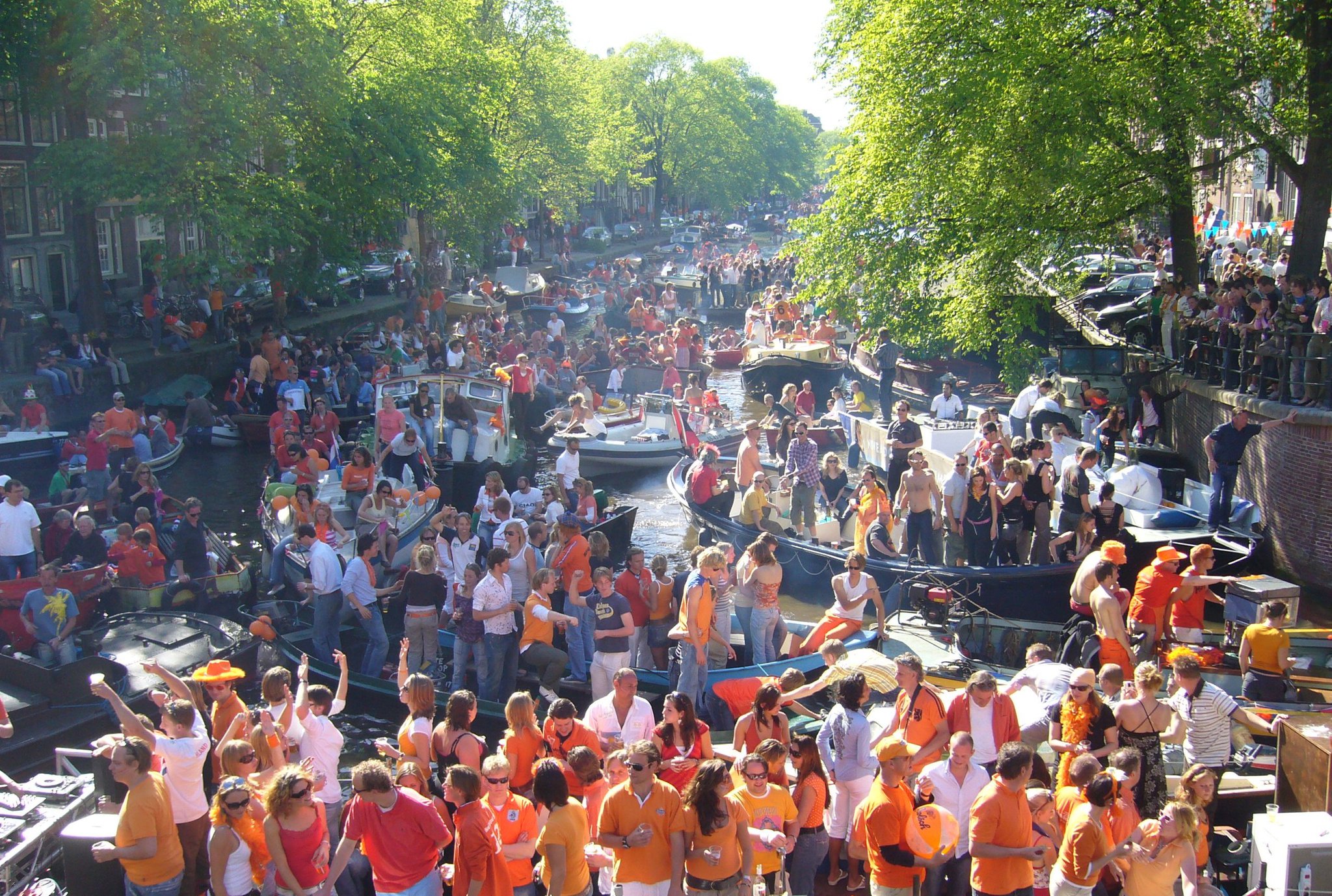
Koninginnedag, also known as Queen’s Day, is a vibrant and festive holiday celebrated in the Netherlands. This annual event, which takes place on April 30th, is a day filled with cheerful festivities, music, and the iconic orange hue that dominates the streets. The holiday originated as a way to honor the birthday of the Queen Mother, Juliana. However, after the ascension of Queen Beatrix to the throne, the date was shifted to her mother’s birthday, January 31st. Over time, it was decided to permanently celebrate Koninginnedag on April 30th, to honor the birthday of Queen Beatrix.
Key Takeaways:
- Koninginnedag, now known as King’s Day, is a vibrant Dutch celebration filled with orange pride, street markets, boat parades, and lively music festivals, bringing people together in a spirit of unity and fun.
- The holiday fosters community bonding, traditional cuisine enjoyment, and children’s activities, creating a day of joy and connection for the Dutch people, both at home and around the world.
The Origin of Koninginnedag
Koninginnedag, also known as Queen’s Day, is a Dutch national holiday celebrated on April 30th. Its roots can be traced back to 1885, when it was first observed in honor of Queen Wilhelmina’s birthday.
Koninginnedag Becomes King’s Day
In 2014, following the inauguration of King Willem-Alexander, Koninginnedag was renamed Koningsdag (King’s Day) and is now celebrated on his birthday, April 27th.
Orange is Everywhere
On Koninginnedag, the entire country turns orange. People don orange clothing, accessories, and even paint their faces orange as a sign of national pride and in tribute to the Dutch royal family, whose last name is “Van Oranje” (meaning “of Orange”).
The Largest Street Market in the Netherlands
One prominent feature of Koninginnedag is the massive street market held throughout the country. It is an opportunity for people to sell their second-hand goods, clothes, furniture, and more on the streets. The streets are lined with vendors and shoppers, creating a festive atmosphere.
Boat Parades on the Canals
In cities like Amsterdam, boat parades take place on the canals during Koninginnedag. Private boat owners decorate their vessels and cruise along the canals, creating a vibrant and colorful spectacle.
Music and Dance Festivals
Koninginnedag is known for its lively music and dance festivals. Open-air concerts, street performers, and DJs can be found throughout the country, providing entertainment for the crowds.
The Royal Family’s Activities
On Koninginnedag, the Dutch royal family partakes in various activities and visits different cities in the Netherlands. They engage with the public, participate in games, and attend festivities, creating a sense of unity and celebration.
Traditional Dutch Cuisine
Food plays a significant role in Koninginnedag celebrations, with traditional Dutch delicacies being enjoyed by locals and tourists alike. Stroopwafels, herring, and bitterballen are popular treats often found at street stalls and festivals.
Nationwide Street Parties
Throughout the country, street parties are organized on Koninginnedag. Friends and families gather to enjoy live music, dance, play games, and simply have a good time together.
Children’s Activities
Koninginnedag is a day of fun for children as well. Numerous activities, including face painting, games, and fairground rides, are organized specifically for them, ensuring that the younger generation gets to experience the festivities.
Community Spirit and Bonding
Koninginnedag fosters a sense of community spirit and bonding among the Dutch people. It is a day when neighbors come together, streets are closed off to traffic, and people interact and connect with one another.
Koninginnedag Around the World
The Dutch diaspora celebrates Koninginnedag in various parts of the world. Expatriate communities organize events and gatherings to commemorate their culture and heritage, keeping the spirit of Koninginnedag alive.
Conclusion
In conclusion, Koninginnedag, also known as Queen’s Day, is a vibrant and significant event celebrated in the Netherlands. It is a day filled with festivities, parades, and a sense of national pride as the Dutch people honor their reigning monarch. The tradition of Koninginnedag dates back to the late 19th century and has evolved over time, truly becoming a reflection of Dutch culture and unity. From the famous orange clothing and accessories worn by the revelers to the lively open-air markets and street parties, Koninginnedag is a spectacle that showcases the spirit and enthusiasm of the Dutch people. It is a day that brings both locals and visitors together in celebration and ensures an unforgettable experience. Whether you’re a history enthusiast, a fan of cultural celebrations, or simply looking to immerse yourself in a festive atmosphere, Koninginnedag is a must-see event that should be on your bucket list.
FAQs
Q: When is Koninginnedag celebrated?
A: Koninginnedag is celebrated on April 30th.
Q: Is Koninginnedag a national holiday?
A: Yes, Koninginnedag is considered a national holiday in the Netherlands.
Q: What is the significance of the color orange during Koninginnedag?
A: The color orange represents the Dutch royal family, specifically the House of Orange-Nassau, and is associated with Dutch national pride.
Q: What are the main activities during Koninginnedag?
A: The main activities during Koninginnedag include street parties, parades, open-air markets, live music performances, and various sporting events.
Q: Are there any age restrictions for participating in Koninginnedag festivities?
A: No, Koninginnedag is a celebration for people of all ages. There are activities suitable for both children and adults.
Q: Can tourists participate in Koninginnedag celebrations?
A: Absolutely! Tourists are more than welcome to join in the Koninginnedag celebrations and experience the excitement and vibrant atmosphere.
Q: Are there any specific dress codes for Koninginnedag?
A: The Dutch people traditionally wear orange clothing or accessories during Koninginnedag as a symbol of national pride.
Q: Are there any safety precautions to be aware of during Koninginnedag?
A: It is recommended to be cautious of large crowds and ensure personal belongings are secure. Also, it is advised to follow any instructions given by authorities and stay hydrated throughout the day.
Q: Are there any specific locations in the Netherlands where Koninginnedag celebrations are particularly grand?
A: The cities of Amsterdam, Rotterdam, and The Hague are known for their festive and lively Koninginnedag celebrations.
Q: How can I learn more about the history and cultural significance of Koninginnedag?
A: There are various museums, historical sites, and guided tours available in the Netherlands that provide insights into the history and cultural significance of Koninginnedag.
Koninginnedag, a beloved Dutch tradition, has evolved into King's Day, yet its spirit remains unchanged. Dive into more fascinating facts about this April 30 celebration, uncover additional details about Queen's Day history, and explore the significance of the color orange in Dutch culture. Each topic offers a unique perspective on this cherished national holiday, promising an enriching journey through the Netherlands' vibrant heritage.
Was this page helpful?
Our commitment to delivering trustworthy and engaging content is at the heart of what we do. Each fact on our site is contributed by real users like you, bringing a wealth of diverse insights and information. To ensure the highest standards of accuracy and reliability, our dedicated editors meticulously review each submission. This process guarantees that the facts we share are not only fascinating but also credible. Trust in our commitment to quality and authenticity as you explore and learn with us.


